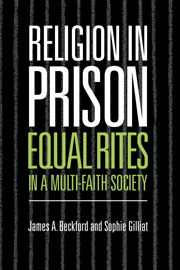Book contents
- Frontmatter
- Contents
- List of figures
- List of tables
- Abbreviations
- Preface
- 1 Equal opportunities and multiculturalism in prisons
- 2 Chaplaincy, chaplains, chapels and other faiths
- 3 Church of England prison chaplains
- 4 Visiting Ministers of other faiths
- 5 ‘Facilitation’ or ‘dependence’?
- 6 Inclusion and exclusion
- 7 Prison chaplaincy in the United States
- 8 Conclusions: state, church and diversity
- Notes
- Appendix
- References
- Index
8 - Conclusions: state, church and diversity
Published online by Cambridge University Press: 22 August 2009
- Frontmatter
- Contents
- List of figures
- List of tables
- Abbreviations
- Preface
- 1 Equal opportunities and multiculturalism in prisons
- 2 Chaplaincy, chaplains, chapels and other faiths
- 3 Church of England prison chaplains
- 4 Visiting Ministers of other faiths
- 5 ‘Facilitation’ or ‘dependence’?
- 6 Inclusion and exclusion
- 7 Prison chaplaincy in the United States
- 8 Conclusions: state, church and diversity
- Notes
- Appendix
- References
- Index
Summary
There are good reasons for trying to avoid the blunt category of ‘other faiths’ when we refer collectively to faith communities as different from each other as Buddhists, Hindus, Jews, Muslims and Sikhs. ‘Other faiths’ is a category which smacks of condescension and superiority on the part of Christianity. It also implies that other faiths are a departure from the Christian norm. On the other hand, our study of religion in prisons has shown that this questionable category is in daily use in the Prison Service of England and Wales and that it is not simply a matter of terminology. Many important, practical things follow from the categorisation of prisoners and Visiting Ministers as members of other faiths. A summary list of the main implications, all of which are findings from this study, includes:
No member of an ‘other faith’ community has been appointed as a full-time or part-time prison chaplain;
The appointment of Visiting Ministers of other faiths and their visits to prisoners are usually facilitated by Church of England chaplains, who also have heavy responsibilities for many other facets of chaplaincy work;
The Prison Service Chaplaincy provided its first training course for Visiting Ministers in April 1997;
Facilites for meetings between Visiting Ministers and prisoners belonging to their faith communities are highly variable and fully adequate in some prisons only;
Relations between Visiting Ministers and prison authorities are usually mediated or brokered by Church of England chaplains;
[…]
- Type
- Chapter
- Information
- Religion in Prison'Equal Rites' in a Multi-Faith Society, pp. 201 - 219Publisher: Cambridge University PressPrint publication year: 1998



